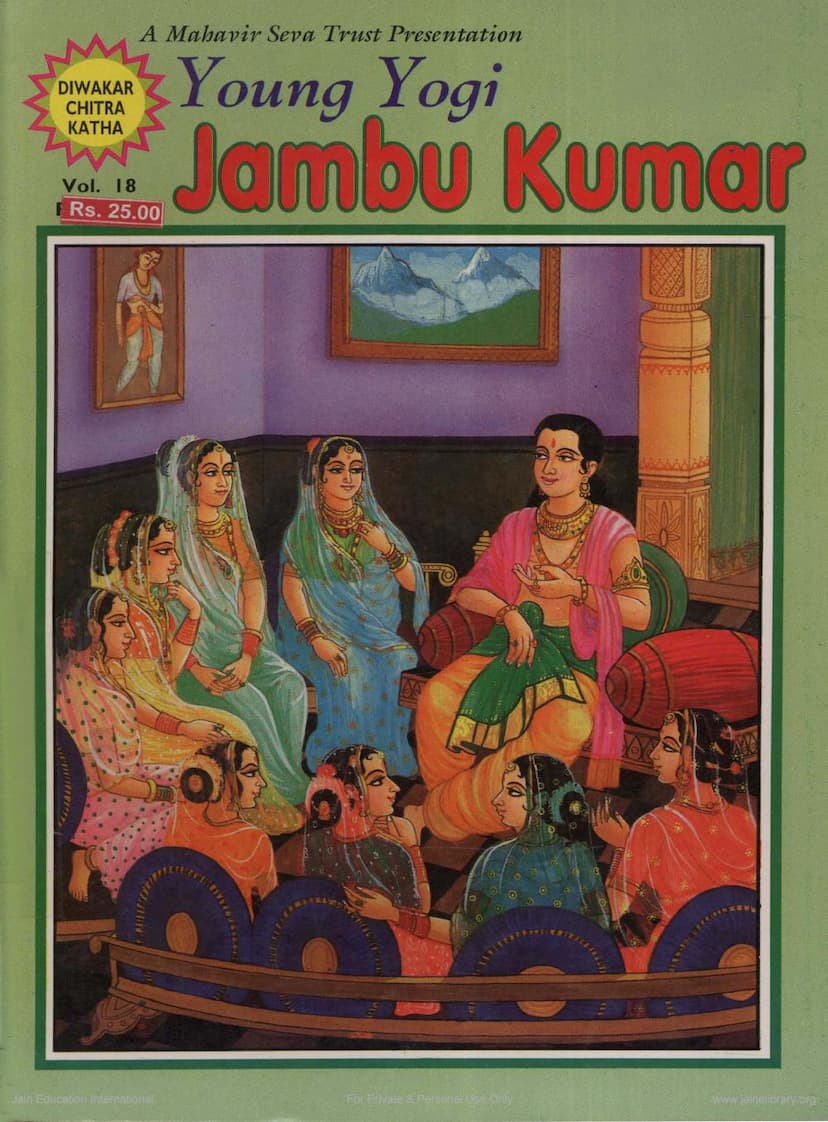Young Yogi Jambukumar Diwakar Chitrakatha 018
Added to library: September 2, 2025

Summary
Here's a comprehensive summary of the provided Jain text, "Young Yogi Jambukumar Diwakar Chitrakatha 018":
This publication, "Young Yogi Jambu Kumar Vol. 18," from Mahavir Seva Trust Mumbai, presents the story of Jambu Kumar, a significant figure in Jain history, through a comic strip format. The narrative highlights his extraordinary detachment and renunciation at a young age, which serves as an exemplary tale of spiritual aspiration.
The Story of Jambu Kumar:
-
Birth and Early Life: Jambu Kumar was born to the wealthy merchant Rishabhdatt and his virtuous wife Dharini-devi in Rajagriha, the capital of Magadh. Despite their immense wealth, the couple longed for a child. An astrologer friend, Jasmitra, predicted that Dharini would give birth to a son whose fame would spread far and wide. This prediction was reinforced by Dharini's auspicious dreams: a lion with a white mane entering her mouth, signifying courage, and a Jambu tree descending from the sky, symbolizing his unique stature and widespread renown. The child was thus named Jambu Kumar. He proved to be an intelligent and accomplished child, mastering seventy-two arts by the age of eight.
-
Marriage and Vow of Celibacy: When Jambu Kumar turned sixteen, his father arranged marriages for him with eight beautiful daughters from wealthy merchant families. However, after attending a discourse by Ganadhar Sudharma Swami, Jambu Kumar experienced an inner awakening and decided to remain celibate for life. This decision deeply saddened his parents, who had envisioned a grand lineage. Jambu Kumar, respecting his parents' feelings, agreed to marry but made it clear that he would take spiritual initiation (Diksha) after the wedding. The eight brides, particularly Samudrashri, were aware of his intention but accepted their fate.
-
The Wedding Night and Dialogue: The wedding ceremony was grand. On the wedding night, Jambu Kumar gathered his eight wives and explained his decision to renounce worldly pleasures. He argued that worldly pleasures, though initially attractive, ultimately lead to misery and sinful karma, drawing parallels to a child licking a honey-coated knife or a coal maker trying to quench his thirst with slime after exhausting freshwater sources. He also shared the story of a monkey that, driven by greed, lost its human form and repented forever. These examples and his profound logic convinced his wives of the ephemeral nature of worldly pleasures and the ultimate bliss of liberation. They expressed their desire to join him on the spiritual path.
-
Encounter with the Bandit Prabhav: During the wedding celebrations, the notorious bandit Prabhav, along with 500 of his men, infiltrated Rishabhdatt's house to steal the dowry. Prabhav used a spell to incapacitate the guards and household members and open the locks. However, his spell had no effect on Jambu Kumar, who remained awake and unaffected. Jambu Kumar, using his own spiritual power, immobilized the bandits. Prabhav, impressed by Jambu Kumar's spiritual strength and detachment, offered to exchange their skills. Jambu Kumar, however, refused to learn any spells, stating that wealth and grandeur were like sand to him. He advised Prabhav to renounce his wicked ways. This encounter led to a significant change of heart in Prabhav. He renounced his bandit life and decided to join Jambu Kumar in his renunciation, along with his 500 followers.
-
Renunciation and Initiation: Jambu Kumar informed his parents of his decision and the decision of his wives to join him. To his surprise, his parents also decided to renounce the world, inspired by their son's unwavering resolve. The news spread throughout Rajagriha, and King Kunik of Magadh came to pay his respects. King Kunik was astonished to see Prabhav and his men ready for initiation and readily pardoned Prabhav for his past crimes at Jambu Kumar's request.
-
The Grand Renunciation Procession: A massive renunciation procession followed, led by King Kunik and his army, followed by divine beings, Jambu Kumar and his eight wives in palanquins, his parents walking, Prabhav and his men, and the general public. The procession reached the Gunasheel garden, where Jambu Kumar, along with 526 other individuals (including his wives, parents, and Prabhav's men), received Diksha from Ganadhar Sudharma Swami.
Additional Information:
- Previous Births: The text mentions that Jambu Kumar was a god named Vidyunmali in a previous birth and that Bhagwan Mahavir had predicted his birth as Jambu Kumar, who would be the last omniscient of the Bharat area.
- Details of Wives and Initiates: A list of Jambu Kumar's eight wives, their parents, and the total number of individuals initiated with him (527) is provided. It also notes that in Digambar texts, Prabhav is known as Vidyucchor.
- Important Dates: Key dates in Jambu Kumar's life, including his birth, initiation, attainment of omniscience, and Nirvana, are outlined.
- Extinction of Spiritual Powers: The text notes that with Jambu Swami's Nirvana, ten special spiritual powers became extinct.
Accompanying Articles:
- Humility: An article discusses the importance of humility in self-development, emphasizing that it fosters respect, understanding, and inner peace. It contrasts worldly pride with the lasting treasures of the heart and highlights that true humility is not timidity but a confident characteristic born from self-respect and respect for others.
- Fourteen Dreams of Queen Trishala: A brief mention of Queen Trishala's fourteen (or sixteen) dreams, which symbolized the virtuous qualities of Lord Mahavira, is included.
- Human Beings are the Five-Sensed Living Beings: A simple explanation of the five senses (ear, eye, nose, tongue, skin) is presented.
In essence, "Young Yogi Jambu Kumar" is a visually presented narrative that celebrates the Jain ideals of renunciation, detachment, and spiritual pursuit, exemplified by Jambu Kumar's extraordinary life choices and their impact on those around him.